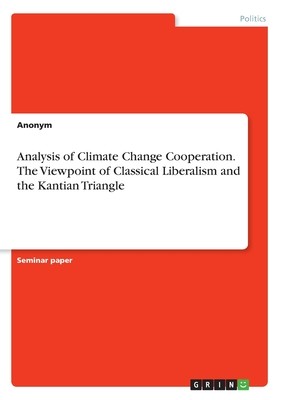
- We will send in 10–14 business days.
- Author: Anonym
- Publisher: GRIN Verlag
- Year: 2020
- Pages: 32
- ISBN-10: 3346178617
- ISBN-13: 9783346178619
- Format: 14.8 x 21 x 0.2 cm, minkšti viršeliai
- Language: English
- SAVE -10% with code: EXTRA
Analysis of Climate Change Cooperation. The Viewpoint of Classical Liberalism and the Kantian Triangle (e-book) (used book) | bookbook.eu
Reviews
Description
Seminar paper from the year 2020 in the subject Politics - International Politics - General and Theories, grade: 2,0, University of Applied Sciences Regensburg, language: English, abstract: Climate change is increasingly becoming a global challenge. This makes cross-border efforts and cooperation of nation states fundamental when searching for constructive and sustainable solutions. It shows relevancy for evaluating and analyzing the interdependencies and interactions between the actors involved. Hence, this paper aims to study the effect of climate change on international relations by examining its impact on the development of international organizations. In order to explain the connection between climate change and international organizations, the political theory of classical liberalism has been used. A special tool applied was the Kantian triangle, which is based on Immanuel Kant's liberal approaches to stability in global systems against the backdrop of classical liberalism. The triangle describes the pacifying effect of an interaction between democracy, economic interdependence and international organizations, which facilitates perpetual peace. Focusing on the factor of international organizations, a brief overview on institutions established and agreements made in order to halt climate change and reduce its implications will then be given at the end of the paper.
EXTRA 10 % discount with code: EXTRA
The promotion ends in 22d.18:37:29
The discount code is valid when purchasing from 10 €. Discounts do not stack.
- Author: Anonym
- Publisher: GRIN Verlag
- Year: 2020
- Pages: 32
- ISBN-10: 3346178617
- ISBN-13: 9783346178619
- Format: 14.8 x 21 x 0.2 cm, minkšti viršeliai
- Language: English English
Seminar paper from the year 2020 in the subject Politics - International Politics - General and Theories, grade: 2,0, University of Applied Sciences Regensburg, language: English, abstract: Climate change is increasingly becoming a global challenge. This makes cross-border efforts and cooperation of nation states fundamental when searching for constructive and sustainable solutions. It shows relevancy for evaluating and analyzing the interdependencies and interactions between the actors involved. Hence, this paper aims to study the effect of climate change on international relations by examining its impact on the development of international organizations. In order to explain the connection between climate change and international organizations, the political theory of classical liberalism has been used. A special tool applied was the Kantian triangle, which is based on Immanuel Kant's liberal approaches to stability in global systems against the backdrop of classical liberalism. The triangle describes the pacifying effect of an interaction between democracy, economic interdependence and international organizations, which facilitates perpetual peace. Focusing on the factor of international organizations, a brief overview on institutions established and agreements made in order to halt climate change and reduce its implications will then be given at the end of the paper.


Reviews